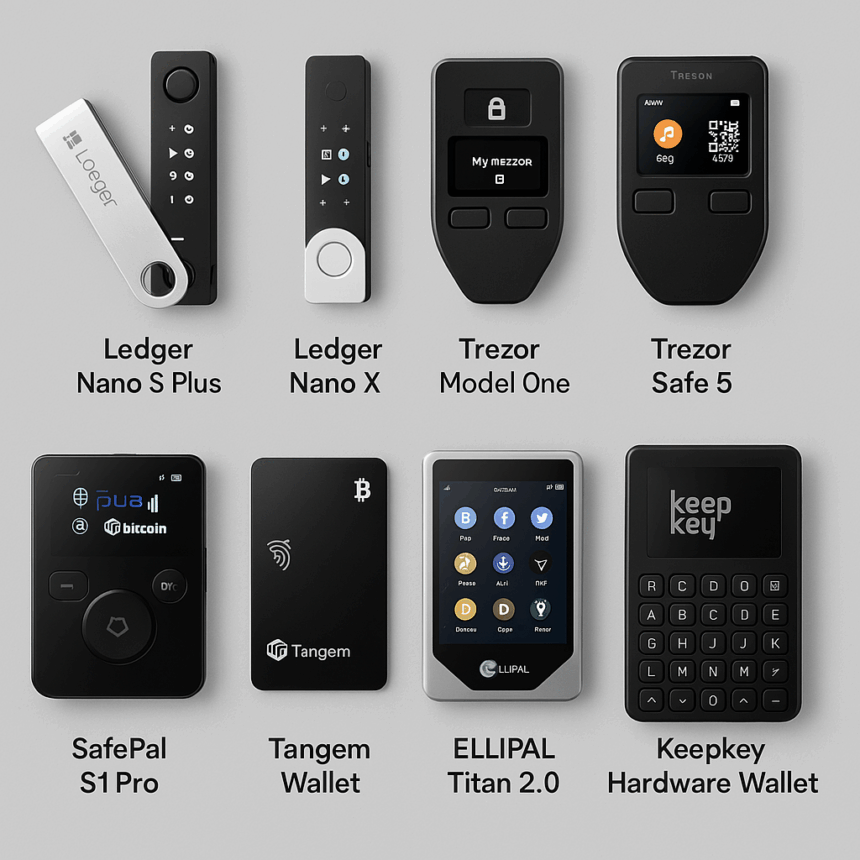In this blog post, well explore Affordable Hardware Wallets for Everyday Use. Unlike some expensive models that cost as much as a laptop, these devices protect your crypto without draining your wallet.
That makes them perfect for brand-new buyers and longtime hodlers alike. Each option we look at keeps coins like Bitcoin and a raft of altcoins locked up tight, while still letting you grab them in seconds when you need to.
Key Feature & Affordable Hardware Wallets for Everyday Use
| Hardware Wallet | Key Feature |
|---|---|
| Ledger Nano S Plus | Reliable and budget-friendly, supports 5,500+ coins |
| Ledger Nano X | Bluetooth-enabled for mobile use, supports 5,500+ coins |
| Trezor Model One | Open-source firmware, compact design, supports 1,289+ coins |
| Trezor Safe 5 | Advanced privacy features, supports 9,000+ coins |
| SafePal S1 | Air-gapped security, Binance-backed, supports 30,000+ coins |
| SafePal S1 Pro | Upgraded security features, supports 30,000+ coins |
| Tangem Wallet | NFC-enabled, screenless design, beginner-friendly |
| ELLIPAL Titan 2.0 | Rugged, air-gapped, anti-tampering security |
| KeepKey Hardware Wallet | Large display, PIN and seed phrase protection |
| Coldcard Q | Bitcoin-only wallet with strong physical security |
1. Ledger Nano S Plus
The Ledger Nano S Plus might be just right. It usually sits around the $79 mark, so the price wont make your wallet wince. Inside the unit is a hardened secure chip (rated CC EAL5+), the sort of tech that laughs off most digital break-ins.
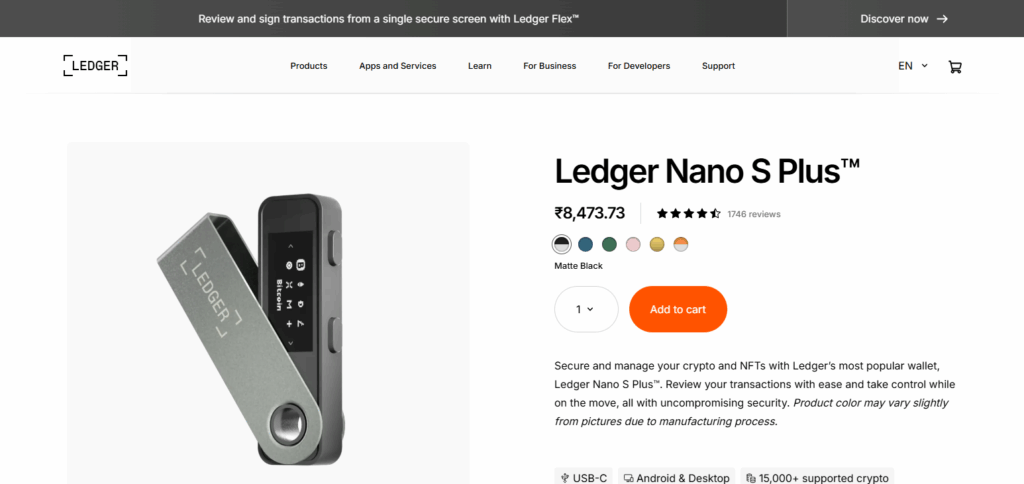
Hook it up with USB-C and use it on Windows, macOS, or even Linux. Thanks to Ledger Live you can juggle over 100 apps at once and still explore a library of 5,500-plus coins, from Bitcoin and Ethereum all the way to smaller ERC-20 tokens.
Whether you trade on weekends or simply stash for the long run, the S Plus gives solid peace of mind without emptying your pocket.
Ledger Nano S Plus
- Price: Roughly $79
- Coin Support: 5,500-plus coins including Bitcoin, Ethereum, and ERC-20 tokens
- Security: Locks your keys in a certified secure element (CC EAL5+) so they’re never online
- Connectivity: USB-C port works with Windows, macOS, and Linux
- Features: Run about 100 apps at once, manage everything through the Ledger Live program, and slip it into any pocket
- Best For: People who want strong protection without breaking the bank
2. Ledger Nano X
The Ledger Nano X sits at roughly $149, putting it in the premium-wallet league. Unlike budget gadgets, this one shrugs off multiple coins-it can handle 5,500-plus tokens through the Ledger Live app.
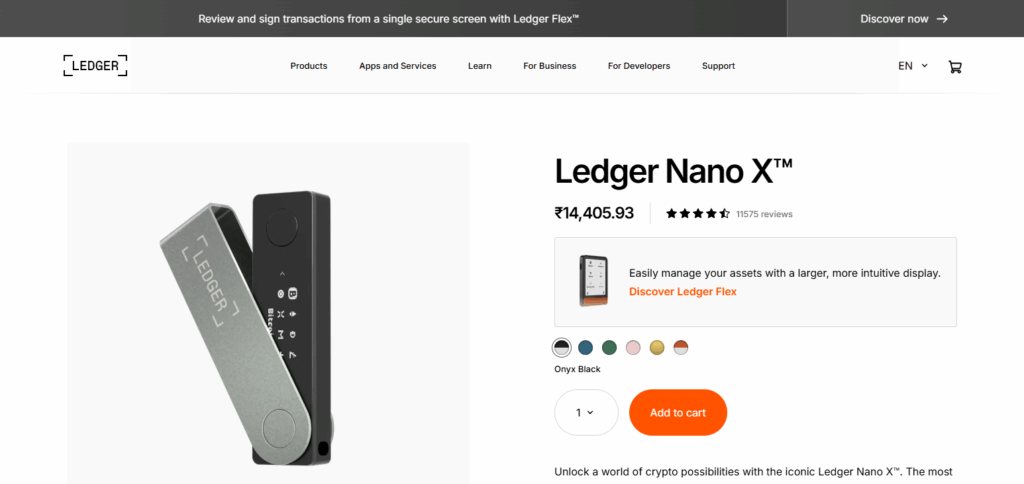
Bluetooth is the headline feature; slip your phone near the device and the two sync automatically. USB-C keeps the desktop crowd happy, so Mac and Windows folks are covered. Monied users will notice the beefed-up memory that runs 100 apps at once without breaking a sweat.
Security stays offline thanks to a hardened CC EAL5+ chip, meaning private keys never touch the web. An easy menu and mobile pairing make quick swaps simple, though the price jump comes from that onboard wireless and pocket-friendly design.
Ledger Nano X
- Price: About $149
- Coin Support: Supports the same massive library of 5,500-plus cryptos
- Security: Uses the same hardened chip as the S Plus, keeps keys offline
- Connectivity: Pairs over Bluetooth or plugs in via USB-C, works on phone and laptop alike
- Features: Sync with the Ledger Live mobile app, hold around 100 programs, and enjoy extra freedom on the go
- Best For: Anyone who needs to send coins from their pocket and still trust the security
3. Trezor Model One
The Trezor Model One pops up on shelves for about $69, which beats a lot of the pricier wallets out there. It runs open-source code, so anyone can peek under the hood and see what the firmware is really up to.
Shop owners like to call that total transparency, and most new users simply call it trust. Because the casing is small and light, slipping it into a pocket or laptop sleeve is never a hassle. The screen is old-school monochrome, but that lets you double-check each transaction without any battery-draining bells and whistles.
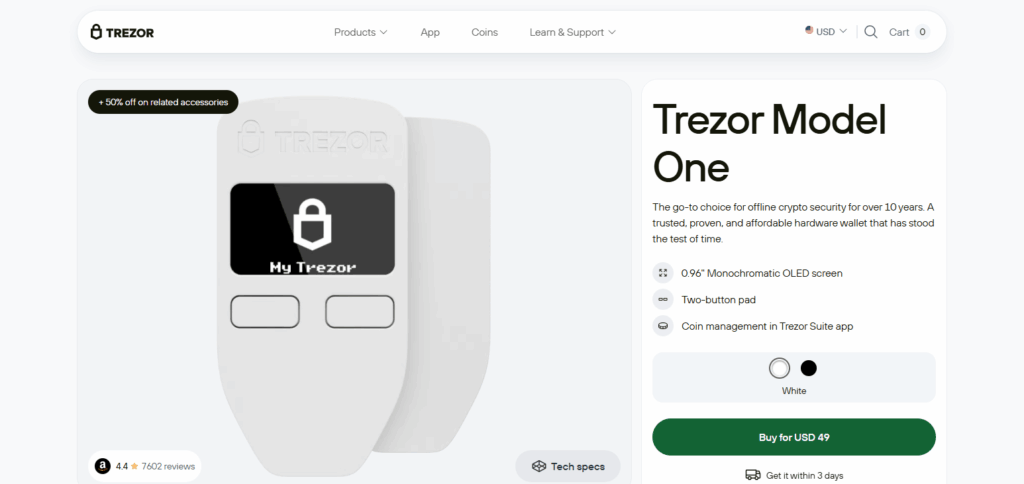
A PIN keeps nosey neighbors out, and the recovery seed means a spilled drink wont fry your entire crypto stash. You wont find Bluetooth or touchscreen bells here, yet that stripped-down style is exactly why beginners often feel comfortable on day one.
For day-to-day Bitcoin, Ethereum, or one of the other 1,400 coins, the Model One acts like a tour guide, not a roller coaster, and Trezors long-standing reputation adds a safety net almost everyone notices.
Trezor Model One
- Price: Priced around $69
- Coin Support: Handles over 1,400 coins, including major players like Bitcoin and Ethereum
- Security: Open-source firmware, requires a PIN, and lets you write down a recovery seed
- Connectivity: USB connection, runs on the Trezor Suite dashboard
- Features: Small form factor with a simple monochrome screen for checking and signing transactions
- Best For: Newbies who want a transparent wallet that won’t dent the budget
4. Trezor Safe 5
The Trezor Safe 5 pops on the screen at $169 to $199, and plenty of self-proclaimed crypto experts already say its the pocket vault people have been waiting for. Inside the little black box you can stash up to 9,000 coins-give or take a few odd tokens-showing no real bias towards Bitcoin, Ethereum, or anything else the market throws your way.
Unlike older models, a bright color touchscreen takes the guesswork out of number punching, so first-timers dont end up staring at the wrong seed phrase for thirty minutes. Shamir Backup is still weirdly named but absolutely smart, locking your recovery info in bits and pieces that would bore even the snoopiest hacker.
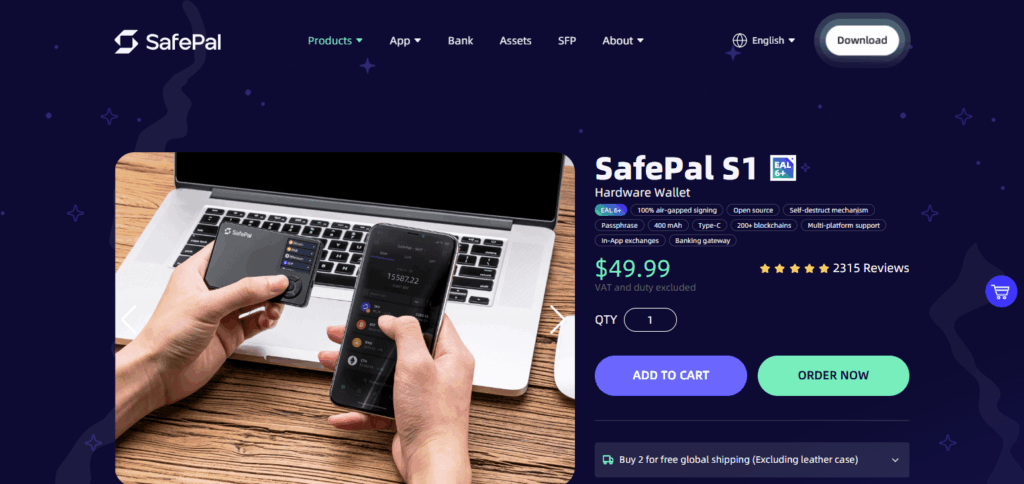
By leaning on USB-C, Trezor keeps the plug friendly with new laptops while keeps it slim enough to slide behind a bus card. Sure its pricier than the Model One, but folks running daily trades seem perfectly willing to cough up the difference for that extra layer of calm.
If you want the nitty-gritty on which coins are missing or lurking in the wings, the companys own dashboard is the only place thatll tell you today.
Trezor Safe 5
- Price: Can range from 169to169to199, depending on stock
- Coin Support: Rumored to cover nearly 9,000 different tokens
- Security: Shamir Backup option, plus military-grade encryption and a required PIN
- Connectivity: USB-C and stacks neatly with Trezor Suite for easy navigation
- Features: Bright color touchscreen and privacy settings that go a step further
- Best For: Investors who care about keeping a large, varied collection under tight wraps
5. SafePal S1
The SafePal S1 comes in around fifty bucks and offers plenty of bang for the buck. Backed by Binance, it gives everyday coin-hodlers a solid spot to stash their crypto without breaking the bank.
More than thirty thousand tokens-swap Bitcoin, Ethereum, or nearly anything on the Binance Smart Chain-and sleep easy.
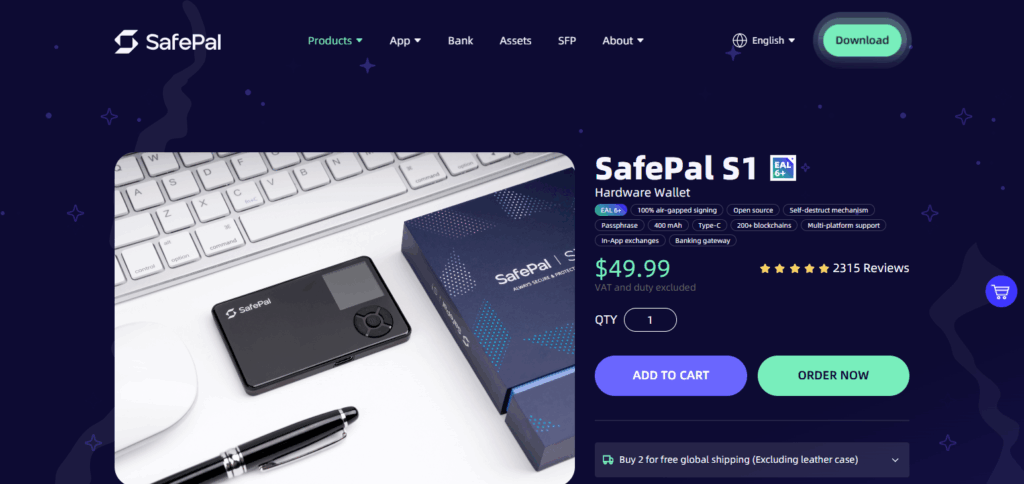
Because the wallet never plugs in, USB and Bluetooth headaches vanish. Transactions z zip back and forth via little QR codes, turning the device into an island no hacker can swim to.
A 1.3-inch screen keeps numbers readable, and a tamper-proof secure element chip locks down the private keys. Compact enough to slip into a pocket, the hardware pairs with the SafePal app for swipe-and-manage ease.
Budget-friendly and packed with coin support, the S1 stands out for anyone who wants daily crypto peace of mind without an online leash.
SafePal S1
- Price: Sells for about $49.99
- Coin Support: Claims compatibility with 30,000 tokens and over 100 blockchains
- Security: Works air-gapped, meaning it never talks to Wi-Fi or Bluetooth even while updating
- Connectivity: QR code transfers instead of cables, keeping the device truly offline
- Features: Compact design, built-in camera for scanning addresses, and long-lasting battery
- Best For: Mobile traders who want a cheap, nearly unhackable option
6. SafePal S1 Pro
The SafePal S1 Pro sits in the $69-to-$99 range and feels like a pocket-sized vault for your crypto. You can store more than 30,000 tokens across 100-plus blockchains, so your altcoin habit won-t hit a wall.

Unlike some gadgets that still chatter online, this one signs transactions with QR codes and stays completely air-gapped. An upgraded secure chip is inside, plus some hush-hush anti-tamper goodies that SafePal hasn-t fully detailed.
Pair it with the SafePal app and the dashboard is pretty much drag-and-drop for Bitcoin, Ethereum, and friends. Because it keeps your keys off the web and costs less than a dinner out, everyday users finally have a wallet that won-t break the bank or the bank itself. Binance-s name on the box doesn-t hurt, either.
SafePal S1 Pro
- Price: Around 69to69to99 is typical.
- Coin Support: Handles over 30,000 tokens across 100+ chains.
- Security: Stays air-gapped and features an upgraded secure element that resists tampering.
- Connectivity: No wires or Bluetooth; everything moves via QR codes.
- Features: More security than the original S1 and pairs seamlessly with the SafePal app.
- Best For: Anyone who wants stronger offline protection without spending a fortune.
7. Tangem Wallet
Tangem sells a three-card kit for about $54, give or take a dollar. Slip on a card, tap your phone, and the money moves-no cords, no fuss.
Thousands of digital coins fit inside the tiny chip. A free app does the number-crunching, and the cards never need a battery because the phone powers everything.
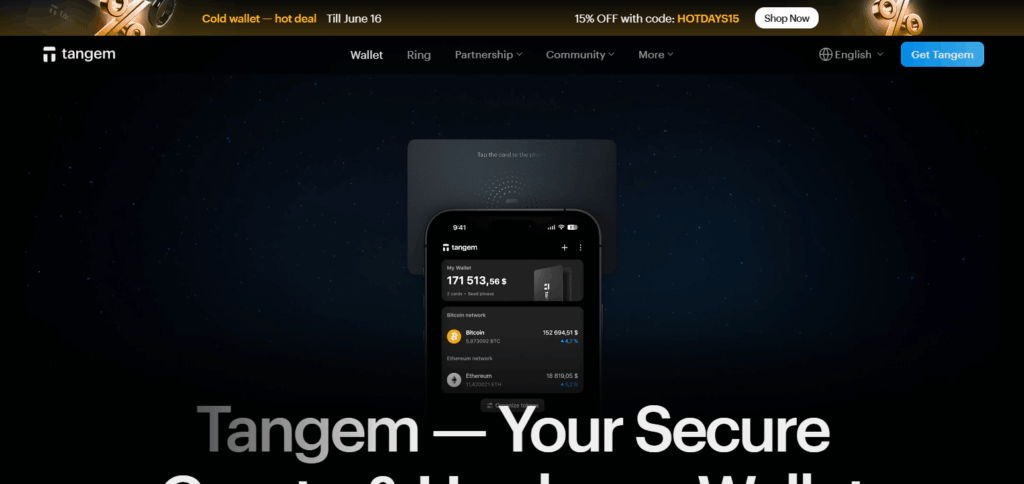
Designed for people who forget chargers, the credit-card size slides into any wallet. Beginners appreciate that there are no blinking screens to read.
Private keys hide in hardware tough enough for bank vaults. Lose a card? A backup copy keeps you out of trouble.
Seasoned traders may wish for a display, but casual users like the low price and speedy taps. Because it talks only to smartphones, it suits folks who stay glued to their devices.
Tangem Wallet
- Price: A 3-card pack costs about $54.90.
- Coin Support: Works with thousands of cryptos, almost anything you throw at it.
- Security: Built-in secure chip, no display, and a backup card keeps data safe.
- Connectivity: NFC only, you do need a smartphone.
- Features: Screenless design is light and beginner-friendly.
- Best For: People who want ultra-portable storage and zero fuss.
8. ELLIPAL Titan 2.0 – A Quick Look
The ELLIPAL Titan 2.0 sits at about $169 and feels like the tough gadget everyone wishes they had. Its metal casing laughs off bumps and scratches, and built-in alarms fry the memory if anyone tries to crack it open.
That peace of mind comes from an air-gapped setup: the wallet talks by flashing QR codes, so Wi-Fi, USB, or Bluetooth have no voice in the room.
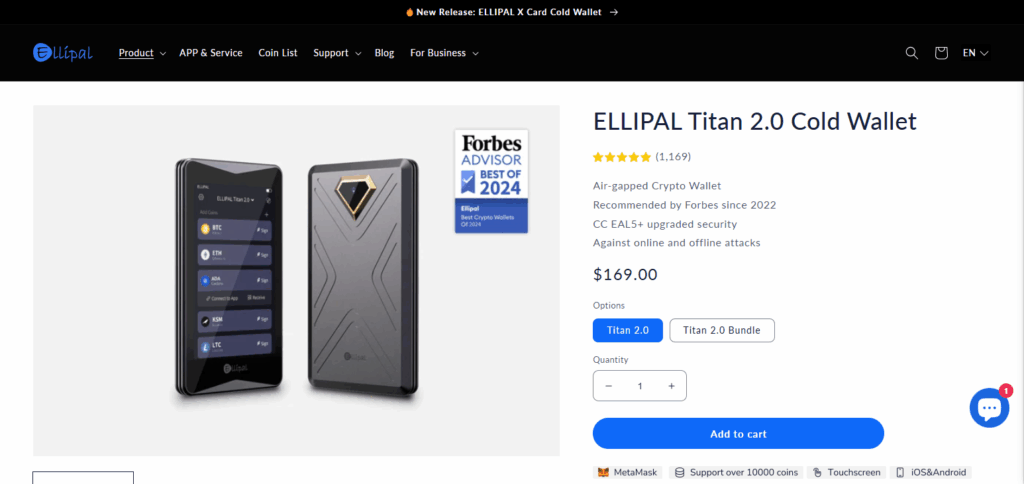
On the front you get a bright 4-inch touchscreen that responds to the lightest tap. The device keeps a huge library of coins happy-40-plus blockchains, including Bitcoin, Ethereum, and then some.
Sure, the price tag stings a little, yet nearly every daily user says the extra cash pays off in quiet confidence. People who juggle crypto all day love knowing their funds travel offline while they swipe and scan their way through trades.
ELLIPAL Titan 2.0
- Price: Typically retails for $169.
- Coin Support: Plays nicely with thousands of cryptos on 40+ different blockchains.
- Security: Keeps itself air-gapped; anti-tampering features and a self-destruct option are included.
- Connectivity: Moves data with QR codes-missing USB and Bluetooth on purpose.
- Features: Tough metal casing and a 4-inch touchscreen make daily use easy.
- Best For: Users who want top-tier offline safety, come rain or shine.
9. KeepKey Hardware Wallet
The KeepKey hardware wallet usually sells for $49 to $79 and still ranks as one of the cheaper ways to lock up cryptocurrency. Users can safely store Bitcoin, Ethereum, and 40 or so other coins on the same little device.
A big screen shows every transaction clearly, so theres no second-guessing what youre about to approve. A simple PIN plus the usual recovery phrase keep prying eyes out.
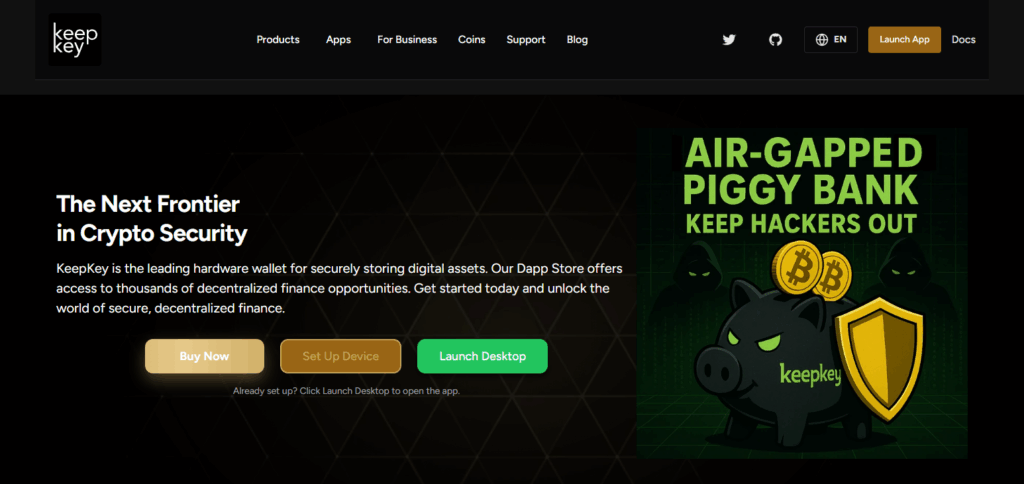
You plug the wallet into a USB port and manage everything through the ShapeShift app, which is quick and painless. The setup feels almost old-school compared to newer models that cram in support for hundreds of altcoins.
That missing versatility wont bother most newcomers who plan to hold major coins on a daily basis. The no-frills design, reliable security, and low price make the KeepKey a sensible choice for anyone trying hardware wallets for the first time. A well-known brand backs it, so buyers enter the crypto world with a bit of peace of mind.
KeepKey Hardware Wallet
- Price: Generally falls between 49and49and79.
- Coin Support: Covers 40+ major cryptos.
- Security: PIN entry, a private seed phrase, and total offline storage.
- Connectivity: Plugs in via USB and has built-in ShapeShift swaps.
- Features: Large screen lets you verify transactions without squinting.
- Best For: Newbies who stick to popular coins but still want wallet hardware.
10. Coldcard Q
The Coldcard Q, a recent upgrade most folks call the Mk4, lists for about $149 and locks down your Bitcoins better than any phone app. Because it sticks almost entirely to Bitcoin – with just a couple of side altcoins – the wallet doesnt waste space on coins you dont hold.

Transactions slide through an air-gapped channel; you move data by microSD card or by flashing QR codes, so the wallet never touches Wi-Fi, Bluetooth, or even a charging cable. Inside, a certified secure element chip pairs with your PIN and multisig keys to handle the heavy lifting for pros who like to double-check their work.
Maybe the best part is the pocket-sized, brick-wall firmware that handles a dozen trades a day without fuss. If you stack only Bitcoin and sleep better with steel vaults around your secret keys, this wallet hits the sweet spot.
Coldcard Q
- Price: Usually around $149.
- Coin Support: Targets Bitcoin only; altcoin lovers might look elsewhere.
- Security: Remains air-gapped, has a secure element, and fully supports multisig setups.
- Connectivity: Exports data via microSD or QR codes-none of those pesky wireless radios.
- Features: Custom PIN, advanced Bitcoin tools, and rugged by design.
- Best For: Die-hard Bitcoin fans who’d rather lose their luggage than compromise on security.
Conclusion
Crypto owners love hardware wallets because they keep coins safe when the internet does not. Pick almost any model-Ledger Nano S Plus, Trezor Safe 5, Coldcard Q, or ELLIPAL Titan 2.0-and youll get peace of mind at a fair price.
Prices stretch from $49 for a simple KeepKey up to $199 for the feature-packed Coldcard, so almost any budget can find a fit. Beginners often grab the bright-screen Tangem or the easy-click KeepKey, while pros lean on air-gapped signing and tamper-proof chips.
Support for thousands of tokens, plus extras like Bluetooth or NFC, means users do not have to juggle multiple devices just to move funds. One wallet can handle Bitcoin, Ethereum, stablecoins-your call.


